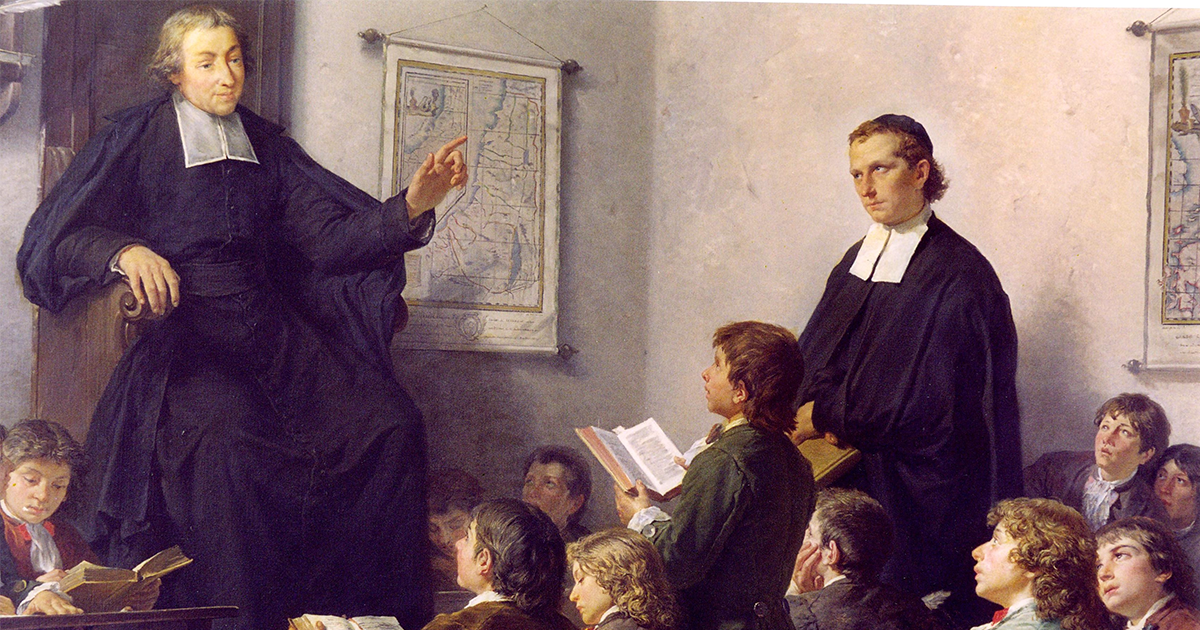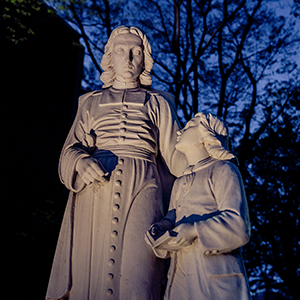Br. Robert “Bob” Shieler, FSC, Ed.D., ‘72, reflects on the 300th anniversary commemorated on Jan. 26, 2025.

Saint John Baptist de La Salle, the Patron Saint of Teachers, founded the Brothers of the Christian Schools in 1680. The Brothers were officially recognized by Pope Benedict XIII in 1725.
Official Recognition of the Institute
The papal bull, In apostolicae dignitatis solio, signed by Pope Benedict XIII on Jan. 26, 1725, officially recognized the Brothers of the Christian Schools as a religious institute in the Church. A bull is a document or proclamation from the pope. The term bull comes from the Latin name for the seal (bulla) on the document that authenticates the proclamation.
While overjoyed at this recognition of their institute, the Brothers did not realize that the bull’s prologue domesticated the institute’s charism. The newness of what Saint La Salle and the first Brothers were doing in the education of children and in their community life together went beyond traditional religious life as understood by the Church at the time. Canon Blain, one of Saint La Salle’s first biographers, wrote that when the Brothers decided to call themselves “Brothers,” these “early disciples of John Baptist de La Salle discerned that God was calling them to live a new and still evolving form of consecration to God as educators of poor children.”1 The Church, at the time, did not understand the work of the Holy Spirit in raising up this new way of serving the Gospel. They could only place the charism into the known religious congregation categories of the time.
How did this domestication happen?

The Vows
Prior to the bull, the Brothers pronounced three vows: obedience, association, and stability. The three are for an apostolic purpose, the Christian education of youth in schools.2 However, for the Brothers to receive papal and official recognition of their institute, they needed to include in their petition the three traditional vows of religious life: poverty, chastity, and obedience. The naming of the three classical vows of religious life brought the Brothers’ institute closer to the traditional understanding of the nature of religious life. Regarding these classical vows, Brother Josean Villalabeitia notes:
Certainly, the Brothers lived these virtues from the first moments of the Institute, and even did so with extreme vigor, if we heed the indications of the Rule. However, they never expressed them as vows, if we except obedience, which was at the beginning rather related to association for the mission.3
Required to include the classical vows, and other elements in the bull’s prologue, led to some confusion on the meaning of the Brothers’ consecration and Saint La Salle’s original inspiration.
With the bull, the vow of association disappears. It was replaced with the vow “to teach gratuitously.”4 Through the centuries, the vow of association was absent from the Brothers’ vow formula. However, it was not lost. In 1987, the Brothers’ new rule of life returned the original wording of association for the poor to the vow formula, but as a promise, not a vow. In 2007, at the Brothers’ 44th General Chapter, association was restored as a vow and placed first in the vow formula. What “had been lost in the twists and turns of history” since the bull’s proclamation, had been recovered by these two actions.
Lasallian scholar Brother Antonio Botana said the Lasallian charism was born through the attentiveness of Saint La Salle to the actions of the Holy Spirit in his life and not to a preconceived notion of religious life. To accomplish the work of God, John Baptist de La Salle makes no reference to a supposed fidelity to determined canonical vows but to the Spirit of Jesus whom we must beseech so that He gives us to know the gifts that He has granted to complete His work.5
The Voice of Brother Superior

To participate in the completion of God’s work, Brother Armin Luistro, FSC, Brother Superior writes in his 2025 Pastoral Letter to the Brothers and Lasallian Family:
Unpacking education may be the biggest challenge for an Institute that has outlived and outsmarted social and political upheavals in many parts of the world for 344 years. The tercentenary of the issuance of Pope Benedict XIII’s Bull of Approbation this coming year is an opportune time to celebrate the stability and social protection that an official recognition of the Church or State affords. But our long history, tradition, reputation, or legal status should not numb us to complacency; on the contrary, it should sensitize us to the continuing threats to schools and the fragility even of long-established institutions. Today, we are all painfully aware of the global crises in education and some very real threats to the sustainability of our schools….
While rooted in our founding story and attentive to the emerging needs of the young and the poor, we cannot keep repeating the same formula of success documented in many versions of the Conduct of Schools and modern manuals that have been the playbook for many Lasallian schools through the centuries….
We certainly cannot continue to ignore the social contradictions of our time. Faced with seemingly insurmountable challenges, we could learn invaluable lessons from those who have realized a long time ago that it truly takes a village—and many generations—to educate a child.6
Heeding these sentiments, and “together and by association” may the charism entrusted to Saint La Salle and the first Brothers continue to remain ever new in the hearts and minds of Lasallian Partners and Brothers entrusted with the mission.
1 Circular 246. Bulletin of the Institute of the Brothers of the Christian Schools, 43rd General Chapter, Reflection of Brother John Johnston (Rome, 2000) p. 31.
2 Cf. Josean Villalabeitia, FSC. “To Procure your Glory”: Lasallian Identity, According to the Brothers’ Formulas of Profession. MEL Bulletin 54 (Rome, December 2019), pp.
3 Ibid., p. 35.
4 Ibid., p. 37.
5 Cf. Antonio Botana, FSC. The Style of Life for the Religious Educator Begun with Saint John Baptist de La Salle and its Perspectives for Today. Address to the Capitulants to the 43rd General Chapter of the Brothers of the Christian Schools, (Rome, 2000) p. 2.
6 Armin Luistro, FSC. Our heart in the peripheries: Renewing the Lasallian Mission with Lessons from Indigenous peoples. Pastoral Letter (Rome, 25 December 2024) pp. 5-6, 7-8.
The post Celebrating 300th anniversary of Christian Brothers recognition appeared first on La Salle University.

0 Commentaires